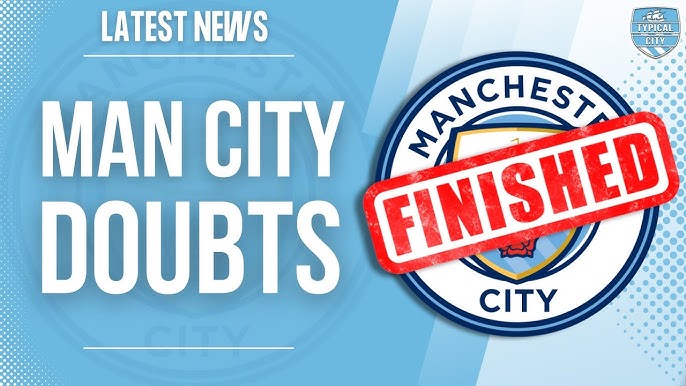Manchester City to renew contracts with Dias and Lewis

Manchester City’s management has made a decisive move to secure the club’s defensive foundation for the foreseeable future, with reports emerging that the Premier League giants are prioritizing contract extensions for two key defensive players: Ruben Dias and Rico Lewis. This strategic decision represents more than just routine contract negotiations; it signals the club’s commitment to maintaining stability and continuity in their defensive structure while building toward sustained success in both domestic and international competitions.
The news, first reported by respected journalist Jack Gaughan, has sent ripples through the football community, highlighting Manchester City’s proactive approach to squad management and their determination to retain crucial talent amid an increasingly competitive transfer market. As the club prepares for what promises to be another challenging season across multiple competitions, these contract renewals represent a cornerstone of their strategic planning.
The Strategic Importance of Defensive Stability
Manchester City’s focus on securing their defensive players reflects a broader understanding of modern football’s demands. In an era where defensive solidity often determines championship success, the retention of proven defenders like Dias and Lewis demonstrates the club’s commitment to building from the back. The Premier League’s physical and tactical demands require players who can adapt to various systems while maintaining consistent performance levels throughout a grueling season.
The club’s third-place finish in the previous Premier League season has clearly influenced their approach to squad planning. While Manchester City has historically dominated English football, the competitive landscape continues to evolve, with rivals strengthening their squads and tactical approaches becoming increasingly sophisticated. In this context, maintaining defensive stability becomes paramount to the club’s ambitions of reclaiming their position at the summit of English football.
The decision to prioritize these particular contract renewals also reflects Manchester City’s long-term vision. Rather than pursuing expensive defensive reinforcements in the transfer market, the club is investing in players who have already proven their worth within Pep Guardiola’s system. This approach not only ensures continuity but also demonstrates fiscal responsibility in an era of increasing transfer fees and wage demands.
Ruben Dias: The Defensive Cornerstone
At 28 years old, Ruben Dias represents the perfect blend of experience and prime athletic years. The Portuguese international has established himself as one of the Premier League’s most reliable center-backs since his arrival at Manchester City. His 44 appearances across all competitions in the most recent season demonstrate his durability and importance to the squad’s structure.
Dias’s impact extends beyond mere statistics. His leadership qualities on the pitch have been instrumental in organizing Manchester City’s defensive line, communicating effectively with teammates, and maintaining the high standards expected at the club. His ability to read the game, make crucial interceptions, and distribute the ball efficiently from defense aligns perfectly with Guardiola’s tactical philosophy.
The fact that Dias recorded neither a goal nor an assist in his 44 appearances might seem unremarkable to casual observers, but for Manchester City, his primary value lies in his defensive contributions. His positioning, aerial ability, and one-on-one defending have been consistently excellent, providing the foundation upon which the team’s attacking play can flourish. In Guardiola’s system, center-backs are expected to be defensively sound first and foremost, with attacking contributions being secondary.
Dias’s contract renewal represents more than just securing a talented player; it’s about maintaining the defensive partnership and understanding that has been built over several seasons. The chemistry between defenders is crucial in modern football, where split-second decisions and perfect positioning can determine the outcome of matches. By retaining Dias, Manchester City ensures that this defensive understanding remains intact.
The Portuguese defender’s experience in high-pressure situations, including Champions League matches and crucial Premier League fixtures, makes him invaluable to the club’s ambitions. His ability to perform consistently at the highest level, regardless of the opposition or circumstances, embodies the mentality that Manchester City seeks to maintain throughout their squad.
Rico Lewis: The Rising Star
At just 20 years old, Rico Lewis represents the future of Manchester City’s defensive structure. His 44 appearances across all competitions demonstrate the trust that Guardiola and the coaching staff have placed in him, despite his youth. His contribution of two goals and five assists showcases his modern full-back capabilities, combining defensive solidity with attacking threat.
Lewis’s development trajectory has been remarkable, transitioning from academy prospect to first-team regular with impressive consistency. His ability to adapt to different tactical requirements, whether playing as a traditional full-back or in more advanced positions, reflects the versatility that modern football demands. This adaptability makes him particularly valuable in Guardiola’s system, where positional flexibility is highly prized.
The young defender’s statistical output of seven goal contributions in 44 appearances represents excellent productivity for a player in his position and age group. His ability to contribute in the final third while maintaining defensive responsibilities demonstrates the complete skill set that Manchester City seeks in their players. This dual capability is essential in modern football, where full-backs are expected to be genuine threats in attack while remaining defensively sound.
Lewis’s contract renewal represents an investment in Manchester City’s long-term future. By securing his services now, the club ensures that they won’t face the challenge of replacing him in the transfer market, where young, proven talent commands premium fees. The stability provided by his renewal allows for continued development within the club’s system, rather than the disruption that would accompany seeking alternatives.
The timing of Lewis’s contract renewal also reflects Manchester City’s commitment to developing homegrown talent. In an era where Financial Fair Play regulations and homegrown player requirements influence squad composition, retaining and developing players like Lewis becomes strategically crucial. His progression from academy to first team represents the successful culmination of the club’s youth development philosophy.
Tactical Implications and System Integration
The renewal of both contracts has significant tactical implications for Manchester City’s approach to the upcoming season. Guardiola’s system requires defenders who understand their roles within complex tactical structures, and both Dias and Lewis have demonstrated their ability to execute these requirements effectively.
Dias’s role as a center-back in Guardiola’s system extends beyond traditional defensive duties. His ability to step into midfield areas, distribute the ball effectively, and maintain possession under pressure makes him integral to the team’s build-up play. His positional awareness allows Manchester City to maintain their high defensive line while providing security against counter-attacks.
Lewis’s versatility provides Guardiola with multiple tactical options. Whether deployed as a traditional full-back, an inverted full-back moving into midfield areas, or in more advanced positions, his adaptability allows for tactical flexibility that can be crucial in different match situations. This versatility becomes particularly valuable when facing varying opposition tactics throughout a long season.
The combination of Dias’s experience and Lewis’s youth creates an ideal balance within the defensive structure. Dias can provide guidance and stability, while Lewis brings energy and pace that can be crucial in high-intensity situations. This mentorship dynamic often proves valuable in developing young players while maintaining team performance standards.
Financial and Strategic Considerations
The decision to prioritize these contract renewals reflects sound financial planning by Manchester City. In the current transfer market, replacing proven defenders would likely cost significantly more than the combined expense of retaining Dias and Lewis. Quality center-backs and versatile full-backs command premium fees, making retention the more economically viable option.
The club’s approach also demonstrates strategic thinking regarding squad planning. By securing these renewals early, Manchester City avoids the uncertainty that comes with players entering the final years of their contracts. This proactive approach prevents potential disruptions and allows for better long-term planning across all areas of the club.
Financial Fair Play considerations also influence these decisions. Retaining existing players typically has different financial implications compared to new signings, potentially allowing for more strategic allocation of resources across the squad. This approach enables Manchester City to maintain compliance with regulations while continuing to compete at the highest level.
Market Context and Competitive Landscape
The Premier League’s competitive landscape continues to evolve, with rivals strengthening their squads and tactical approaches becoming increasingly sophisticated. In this context, Manchester City’s decision to retain proven defenders represents a strategic response to market conditions and competitive pressures.
The transfer market for quality defenders has become increasingly inflated, with clubs willing to pay substantial fees for proven talent. By retaining Dias and Lewis, Manchester City avoids participating in this expensive market while maintaining their defensive capabilities. This approach allows them to allocate resources to other areas of the squad where reinforcement might be more urgently needed.
The timing of these renewals also reflects the competitive calendar that Manchester City faces. With multiple competitions requiring squad depth and consistency, having settled defensive players who understand their roles becomes crucial for maintaining performance levels across all competitions.
Long-term Vision and Club Philosophy
Manchester City’s approach to these contract renewals reflects their broader philosophy of building sustainable success. Rather than constantly seeking new signings, the club recognizes the value of continuity and the importance of players who understand the system and culture.
The investment in both experienced and young defenders demonstrates a balanced approach to squad development. While Dias provides immediate stability and leadership, Lewis represents the future of the club’s defensive structure. This combination ensures both short-term competitiveness and long-term sustainability.
The club’s commitment to developing and retaining talent also aligns with their broader objectives regarding Financial Fair Play compliance and sustainable growth. By investing in existing players rather than constantly seeking external additions, Manchester City demonstrates a mature approach to squad management.
Impact on Team Dynamics and Morale
The renewal of these contracts sends positive signals throughout the squad regarding Manchester City’s commitment to retaining key players. This stability can have significant psychological benefits, creating an environment where players feel valued and secure in their roles.
For younger players in the squad, seeing Lewis’s progression and contract renewal provides motivation and demonstrates that the club values homegrown talent. This can encourage academy players to continue their development with the knowledge that opportunities exist within the first team.
The retention of Dias also ensures that his leadership qualities remain available to the squad. His experience and professionalism set standards that benefit the entire team, particularly younger players who can learn from his approach and mentality.
Conclusion
Manchester City’s decision to prioritize contract renewals for Ruben Dias and Rico Lewis represents a strategic approach to squad management that balances immediate needs with long-term planning. The retention of these key defensive players provides stability and continuity while demonstrating the club’s commitment to building sustainable success.
The negotiations, expected to begin in the coming days, represent more than routine contract discussions. They symbolize Manchester City’s determination to maintain their competitive edge while adapting to the evolving demands of modern football. The combination of Dias’s experience and Lewis’s potential creates a defensive foundation that can support the club’s ambitions across multiple competitions.
As Manchester City prepares for another challenging season, these contract renewals provide the defensive stability necessary for sustained success. The club’s proactive approach to retaining key players demonstrates their understanding of the modern football landscape and their commitment to building a squad capable of competing at the highest level.
The successful completion of these renewals will allow Manchester City to approach the upcoming season with confidence, knowing that their defensive structure remains intact and their strategic planning has been executed effectively. This foundation will be crucial as they seek to return to the summit of English football and continue their pursuit of European success.
In an era where defensive stability often determines championship success, Manchester City’s investment in Dias and Lewis represents a cornerstone of their strategic planning. The club’s commitment to these players reflects their broader philosophy of building sustainable success while maintaining the highest competitive standards. As negotiations progress, the football world will watch with interest to see how these renewals contribute to Manchester City’s continued evolution as one of world football’s elite clubs.















